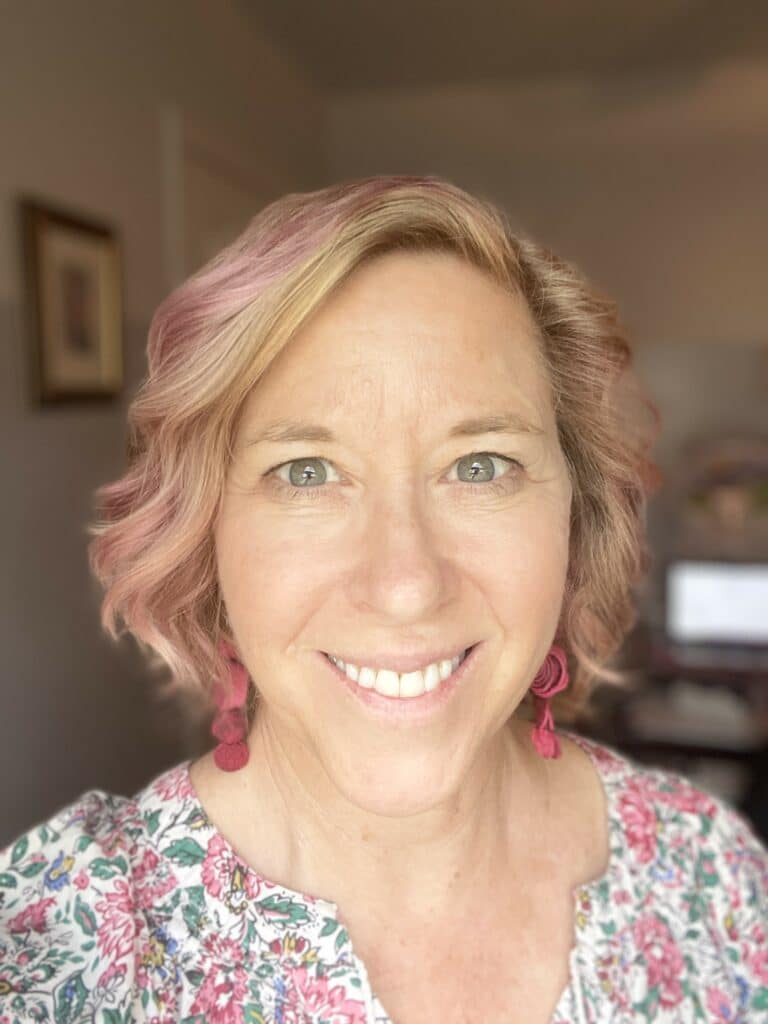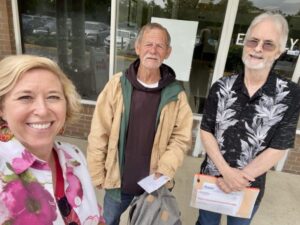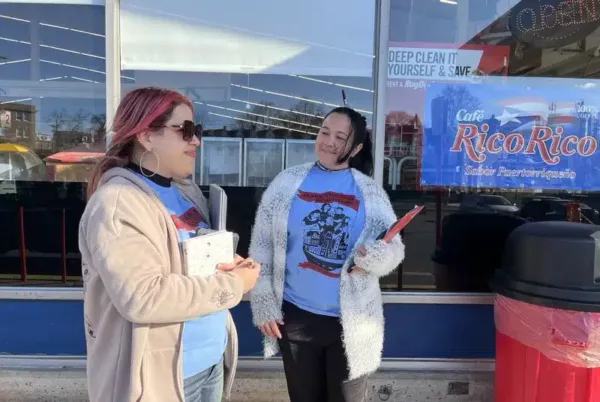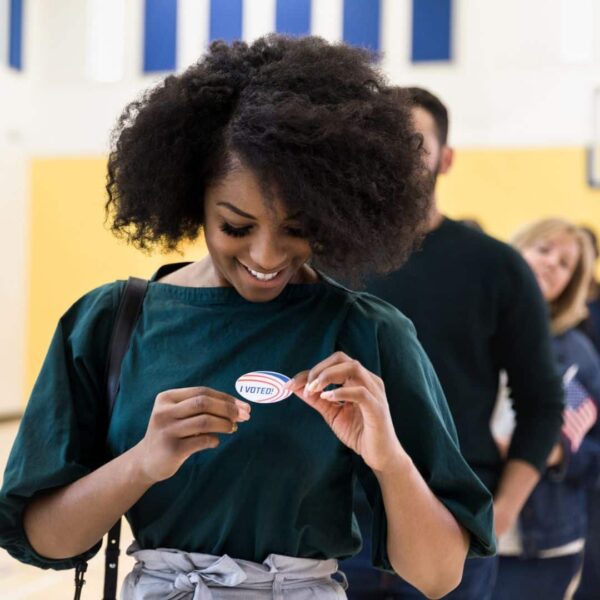
“I Feel Like I’m Doing Something To Make the World a Little Better,” Says VoteRiders Volunteer
In honor of National Volunteer Month, VoteRiders’ Digital Communications Coordinator Erin Carden spoke with Lori Arbuckle, one of our most dedicated and driven volunteers to learn about their volunteer experience, the voters they’ve assisted, and the transformative power an ID can bring to individual lives and our democracy. — APRIL 24, 2024

Tell me about yourself. Aside from volunteering with VoteRiders, what do you do with your time?
I’m in my 50s and I live in Alexandria, Virginia. I work full-time for an international technology accounting firm and I like to bake.
How did you find out about VoteRiders and why did you decide to become a VoteRiders volunteer?
About two and a half years ago, I heard about VoteRiders and what you guys were doing through someone I know who became a VoteRiders volunteer in Florida. I’ve been a volunteer for about two years, but I’ve been helping people get IDs for seven years. I joined VoteRiders because I didn’t want my knowledge to fall to the wayside after my previous volunteer experience.
I first got involved with ID assistance volunteer work because I felt I needed to do something that would make me feel like I had control over what was going on in US elections. I wanted to do something substantive.
In Virginia, ID is required to vote in person. What do you do as a VoteRiders volunteer?
I’m the Virginia Voter ID Assistance Volunteer Coordinator. I coordinate and work with a lot of case managers — who are our partners — by answering their questions and reaching out to them when we have questions. Sometimes I also help find work for some of our other volunteers. I say, “Hey, I think you might want to work on this and this is what it looks like.” And then I also work on getting free IDs and underlying documents for clients. I’ve got two interns from our local college — one freshman and one sophomore — working with us through a Bonner Scholarship Program. I have meetings with them once a week to get them working on helping people get IDs — they have their own clients, but I’m advising them.
What is your favorite part about being a VoteRiders volunteer? What are the more challenging aspects of your volunteer work?
I like being a VoteRiders volunteer because I feel like I’m doing something to make the world a little better, and I get to meet some really interesting people, people I would not normally meet in my everyday life. I meet a lot of locals, people who’ve been born and raised here in Alexandria, Virginia. At this point, I often meet people’s family members because past clients refer their relatives to VoteRiders, so I’ve gotten to know a small network around the community.
I also like going online and ordering replacement IDs for people — that’s kind of fun because it doesn’t take very much time. I also like it when clients express their appreciation — that’s really fun. Yesterday I was at the DMV with a client who thought her driver’s license was suspended. She had just been released from incarceration and it turns out that she was able to get a driver’s license. She was so excited.
Getting people IDs leads to them voting, and it also opens up the world, especially employment. I’m working with a guy right now who’s been desperate to get a job and hasn’t been able to because of difficulties getting his ID. As a volunteer, my job is like detective work. Sometimes I have to think outside the box and then the problem falls away.
Sometimes the more challenging aspects of the volunteer work are also the fun parts. The challenge is sometimes working with clients who are not strong personal historians. I’ve worked with a client who couldn’t remember where he was born. Some people don’t know what their parents’ names are on their birth certificate. These are the things that are challenging to figure out the answer to and you have to employ several different methods to find the answers. For one client, for example, I had to talk to his former foster family and sister. The work was beyond just Googling. Volunteers have had to contact people’s former attorneys to see if they can help us find the missing information — with the client’s permission. I’ve had to get school records to try and figure out what name someone used at a certain time in their life. So it can sometimes be a bit of detective work, which I like — it’s fun but also challenging at the same time.
When I run into a brick wall and I’m not quite sure what to do or there’s particularly difficult bureaucracy, I have to figure out a way to get the system and people to work with me. So many people can be disenfranchised by these roadblocks. This guy who wasn’t quite sure about his birth date, he hasn’t had an ID in almost 20 years. He hasn’t been able to get married — he’s got a fiance — he doesn’t have work because he can’t get his ID without first tracking down his birth date. We’ve been working with him for a year now.
Are there particular issues that you see a lot of people having when it comes to getting ID/underlying documents?
People are constantly running across roadblocks that they can’t figure out how to get around. If someone needs an ID, first they need to get a copy of their birth certificate. But to get their birth certificate, they have to show ID, which is why they need their birth certificate in the first place. It’s this circular motion that makes it hard for people to figure out how to get where they need to go.
Recently, VoteRiders volunteers have been doing some rights restoration requests. We have a couple of partners that work with people coming out of incarceration and many of them want their voting rights restored. So we’re gathering all the information to submit all those requests online because Virginia is one of the states where you have to request it, and it’s up to the government’s discretion on whether they approve it or not. So we submit requests online and people have to wait three months or more — I’ve had clients who have had to wait an entire year to get a response back from the government. It’s terrible. In the meantime, I might lose track of them. Also, they can’t vote.
I have another client who would like to become a notary so he can make additional income but he can’t be a notary until his voting rights are restored since that’s another part of the restoration process. So it’s just one thing after another here in Virginia that makes it harder for people to be fully part of the community.

In addition to voting, a lot of people need an ID for housing. A ton of the people that VoteRiders volunteers work with are living in a shelter or have a temporary living situation — like they were just released from incarceration and they’re in a program for a few months. Many of these people need to get a job so they can start to pay restitution. Even if they have a birth certificate, it’s not enough. They have to have a copy of their birth certificate and an ID to get housing. You also need an ID to get medication.
Another big problem is with the vital records agencies and the fact that they only accept a limited number of documents to prove your identity. Birth certificates in particular are difficult to get. Trying to find someone to notarize an official document for a client who has few identity documents is also difficult.
As I mentioned earlier, we’ve been working with this one guy for a year. He wasn’t quite sure of his birth date — he was born at midnight so he’s not sure what’s on his birth certificate and it’s been a long time since he’s seen it. So it took us a while to track his birth certificate down. And then when we finally did, the vital records office was really hard to deal with because they only accept a certain number of documents, which he didn’t have. I was like, “Come on, there has got to be a way to get him his birth certificate!” They wouldn’t give it to him because it only said, “Baby Boy” and then his last name — it didn’t have his first name. So he would have to amend his birth certificate.
So he had to give a whole bunch of documents to prove his identity. Finally, we ended up finding a manager who would accept something that was out of the ordinary because he didn’t have every piece of documentation on their list. We had to do a name change with the county to get his birth certificate updated to his actual first name. Then the vital records office moved, they lost his documents, and we had to send them all again. So this is why it’s taking so long. It’s been terrible. It’s very frustrating because we don’t get responses back from the vital records agencies. Even though they know it’s been a year that we’ve been trying to do this, there’s no fire under them to get them moving and there’s nothing I can do about it — except I might be able to bring in a Congressman at some point because this is getting stupid.
Have you ever worked with a voter with a memorable story?
I’ve got lots of favorite stories but one of my all-time favorites is from when I first started doing ID assistance work. It wasn’t someone who needed an ID, but he said he had lost his voting rights in the 70s and he said, “I’ve been trying to vote for the last few years. I sign up at voter registration drives but then I’m never able to vote. They don’t allow me.” And I happened to ask him, “Have you had a felony? Did your voting rights get restored?” And he goes, “Oh, I don’t know.” So we were able to help him apply to have his voting rights restored online, and he got approved. I got to take him to vote for the first time in 40 years. I was so happy to see him put his “I Voted” sticker on after he walked away from the polls. Nobody had asked him enough questions in the past to find out what was going wrong. It’s just such a nice feeling to be able to help somebody in need.
Why do you find this work meaningful? Why do you think it’s important to help people secure ID?
Having an ID makes you more whole in society. If you don’t have one, you aren’t really a full-fledged member because everything requires an ID these days. Some people have said to me after getting their new ID, “I’m a real person now” or “Now I exist because I have my ID.” It’s also really important that people with ID no longer have to worry if someone asks to see their ID for a particular reason. If they didn’t have one and someone asked to see it, they could find themselves in a bad situation.
Do you have any advice for a future VoteRiders volunteer or is there anything you might say to someone who is considering volunteering with VoteRiders?
If you like to problem solve, helping someone get an ID is a really interesting thing to do. It can be extremely rewarding too. If you’re interested in doing ID work, you need to be persistent. Being persistent, thinking outside the box, and brainstorming with other people to get around obstacles to try and get someone an ID are skills you should have.
Visit VoteRiders.org/Volunteer to learn how you can get involved.



